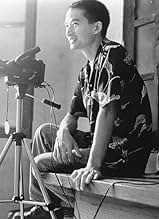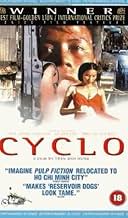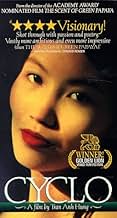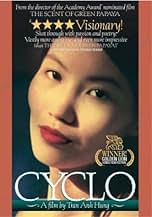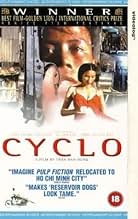Xích lô
- 1995
- 2 घं 3 मि
IMDb रेटिंग
7.1/10
5.8 हज़ार
आपकी रेटिंग
अपनी भाषा में प्लॉट जोड़ेंWhen a poor bicycle-taxi driver has his cyclo stolen, he is forced into a life of crime. Meanwhile, his sister becomes a prostitute.When a poor bicycle-taxi driver has his cyclo stolen, he is forced into a life of crime. Meanwhile, his sister becomes a prostitute.When a poor bicycle-taxi driver has his cyclo stolen, he is forced into a life of crime. Meanwhile, his sister becomes a prostitute.
- पुरस्कार
- 4 जीत और कुल 1 नामांकन
Tony Leung Chiu-wai
- Poet
- (as Tony Chiu Wai Leung)
Nu Yên-Khê Tran
- Sister
- (as Tran Nu Yên-Khê)
Thinh Trinh
- Foot Fetishist
- (as Trinh Thinh)
फ़ीचर्ड समीक्षाएं
Sons lose their fathers, and miss their fathers. In Cyclo, the young man, who earns his living and supports his family by driving a rental cyclo (bicycle-taxi), is a child without parents. In Cyclo, the poet is a child that cannot be accepted by his father. In Cyclo, the retarded son of a widow is a symbol that by which the widow connects in spirit with his father, her dead lover. Under the tangle of missing, recollection of, and conflicting with fathers, Cyclo shows sons going through the shadow of fathers to rediscover themselves.
Father is a symbol of a family, that, when amplified, becomes a nation. In an article "no longer in a future heaven," the author McClintock mentions an idea: mother represents the history of a nation. However, in Cyclo, father (male) symbolizes the history and means where a son comes from. Leaving Vietnam since childhood, the director Tran is detached from Vietnam¡¦s history. But he still is a Vietnamese, because he comes from his father, a Vietnamese. However, to some degree, he is a child without father the history and memory of the Vietnamese past. To Tran, Vietnam, Ho Chi Minh City, and the people in there seem familiar, but are strange, actually. Maybe this can provide one reason as to why Tran uses the characters to spy on people in the streets of Ho Chi Minh City through the frames of windows or lenses. In some situations, spying means alienation-- an ambiguous mood about being eager for something but afraid to get close.
In my view, the women characters in Cyclo have two meanings. First, woman as mother is the one who protects the father's heritage. The widow is an example. She does her best to take care of her son, because in her mind, the son comes from his father and is a reflection of his father, even though he is retarded. The young man's sister, a virgin, represents the sacred image of a nation, which is cannot be invaded. Therefore, when she is assaulted, her man, the poet, rages to kill the attacker.
The characters in Cyclo do not have a name. However, this does not stop audiences to recognize them, or furthermore, to identify with them. Through gazing at their lives, behaviors, and psychological reactions, the young man could be you and me, and the poet could be anyone. They represent different types of people. The young man is a lost lamb. He at once identifies another father-image, the poet. But finally, he knows he is wrong. The poet represents contradictions. His present conflicts with the past (father), and his mentality clashes with his behaviors. If this film is allegorical of a collective loss of innocence of a nation, those characters reflect and depict Vietnamese situations from the director's point of view.
The end of the film shows the young man carrying his grandfather, elder sister and younger sister with a cyclo in a crowded street of Ho Chi Minh City. Sunshine brightly sprinkles on them, and they look very happy. The ending scene shows that through all the chaos, the young man finally rediscovers and re-builds himself in the present. Separated from the past, a son can still live well. Maybe to the Vietnamese, past is past; what is important is the present and future. To Tran, what is important is self-identified.
This is a movie that I strongly recommend.
Father is a symbol of a family, that, when amplified, becomes a nation. In an article "no longer in a future heaven," the author McClintock mentions an idea: mother represents the history of a nation. However, in Cyclo, father (male) symbolizes the history and means where a son comes from. Leaving Vietnam since childhood, the director Tran is detached from Vietnam¡¦s history. But he still is a Vietnamese, because he comes from his father, a Vietnamese. However, to some degree, he is a child without father the history and memory of the Vietnamese past. To Tran, Vietnam, Ho Chi Minh City, and the people in there seem familiar, but are strange, actually. Maybe this can provide one reason as to why Tran uses the characters to spy on people in the streets of Ho Chi Minh City through the frames of windows or lenses. In some situations, spying means alienation-- an ambiguous mood about being eager for something but afraid to get close.
In my view, the women characters in Cyclo have two meanings. First, woman as mother is the one who protects the father's heritage. The widow is an example. She does her best to take care of her son, because in her mind, the son comes from his father and is a reflection of his father, even though he is retarded. The young man's sister, a virgin, represents the sacred image of a nation, which is cannot be invaded. Therefore, when she is assaulted, her man, the poet, rages to kill the attacker.
The characters in Cyclo do not have a name. However, this does not stop audiences to recognize them, or furthermore, to identify with them. Through gazing at their lives, behaviors, and psychological reactions, the young man could be you and me, and the poet could be anyone. They represent different types of people. The young man is a lost lamb. He at once identifies another father-image, the poet. But finally, he knows he is wrong. The poet represents contradictions. His present conflicts with the past (father), and his mentality clashes with his behaviors. If this film is allegorical of a collective loss of innocence of a nation, those characters reflect and depict Vietnamese situations from the director's point of view.
The end of the film shows the young man carrying his grandfather, elder sister and younger sister with a cyclo in a crowded street of Ho Chi Minh City. Sunshine brightly sprinkles on them, and they look very happy. The ending scene shows that through all the chaos, the young man finally rediscovers and re-builds himself in the present. Separated from the past, a son can still live well. Maybe to the Vietnamese, past is past; what is important is the present and future. To Tran, what is important is self-identified.
This is a movie that I strongly recommend.
Another reviewer correctly pointed out this film's weakness: the script. The story starts out strong then about a third of the way through it hops the track.
After that, if you can tell what is going on and above all WHY, you're pretty good--or friends with the author.
The government of the People's Republic of Vietnam cooperated in making this film for, I suspect, political reasons. Specifically, to paint the Chinese and China in a bad light. The setting is Cholon, the Chinatown section of the old city of Saigon, the former capital of the Republic of (South) Vietnam. Saigon is now Ho Chi Minh City of course and the Chinese are almost all gone, fled from the persecution that preceded and followed the 1979 Sino-Vietnamese border war. Even in 1994 when the picture was shot relations between China and Vietnam were tense. This movie depicts Cholon as a center of drug trafficking, vice, thievery and murder in which the U.S. dollar is the most desired currency.
The camera work by Frenchman Benoit Delhomme is pure artistry. Production values are high. The leading lady Tran Nhu Yen-Khe is absolutely riveting--her exotic beauty the best thing by far about the picture. There are some interesting backgrounds, particularly a short interlude where Poet, played by Hong Kong actor Tony Leung, and Sister (Ms. Yen-Khe) escape the filthy and impoverished inner city and spend a day in the countryside. It is no accident I am sure that some of the French architecture that still stands is featured.
The minor roles are convincingly played, the characters sharply defined for all their brief appearances. It is at the center that the film's weaknesses are most evident.
After that, if you can tell what is going on and above all WHY, you're pretty good--or friends with the author.
The government of the People's Republic of Vietnam cooperated in making this film for, I suspect, political reasons. Specifically, to paint the Chinese and China in a bad light. The setting is Cholon, the Chinatown section of the old city of Saigon, the former capital of the Republic of (South) Vietnam. Saigon is now Ho Chi Minh City of course and the Chinese are almost all gone, fled from the persecution that preceded and followed the 1979 Sino-Vietnamese border war. Even in 1994 when the picture was shot relations between China and Vietnam were tense. This movie depicts Cholon as a center of drug trafficking, vice, thievery and murder in which the U.S. dollar is the most desired currency.
The camera work by Frenchman Benoit Delhomme is pure artistry. Production values are high. The leading lady Tran Nhu Yen-Khe is absolutely riveting--her exotic beauty the best thing by far about the picture. There are some interesting backgrounds, particularly a short interlude where Poet, played by Hong Kong actor Tony Leung, and Sister (Ms. Yen-Khe) escape the filthy and impoverished inner city and spend a day in the countryside. It is no accident I am sure that some of the French architecture that still stands is featured.
The minor roles are convincingly played, the characters sharply defined for all their brief appearances. It is at the center that the film's weaknesses are most evident.
8=G=
"Cyclo" tells of an impoverished Saigon family whose son (Cyclo) turns to crime and whose daughter turns to prostitution as a matter of economic survival. A magnificent accomplishment in cinematography, there's little new to be found in the film's somewhat muddled story which is told almost exclusively with the camera as Oscar winning director Anh Hung Tran demonstrates mastery over the lens in delivering this tapestry of pictures which captures the beauty and blight of a bustling Vietnamese city. Not for everyone, "Cyclo" will play best with those who appreciate true artistry in film.
The camera-work in this film is unbelievable. I haven't seen many films from Vietnam but this one is undoubtedly the best. Cinematography is top notch. Some of the photography is mind-boggling. Xich lo is about a young bicycle taxi driver from a poor family who becomes involved in gang activities after his taxi is stolen and his options are limited. The 123 minutes of the film give time for good character development. The gang's lieutenant, Poet, is a ruthless criminal who rarely speaks and is troubled his bad childhood and a recurring nosebleed problem. Madame is the wise leader with a retarded son, Fishmouth. Every character in the story is human, each with their own problems. I am not familiar with the filmmakers' other works so I don't know if there are any political or social messages contained in this film, but one shot of a wealthy, clean development late in the film is shown in sharp contrast to the dirty and violent world that we see in the rest of the film.
My only criticism of this is the pace.. it dragged slightly at a few points, and these seemed to be included in the final cut for the poetry and songs contained in them. I give this film a 10 in the end. Highly recommended.
My only criticism of this is the pace.. it dragged slightly at a few points, and these seemed to be included in the final cut for the poetry and songs contained in them. I give this film a 10 in the end. Highly recommended.
In Vietnam, a cyclo is both the driver of a bicycle taxi and a name given to the taxi itself. In Tran Anh Hung's 1995 film Cyclo, the cyclo driver is a naïve 18-year old (Le Van Loc) whose innocence is corrupted by the choices he is compelled to make to escape the circle of grinding poverty. Cyclo is far removed from the director's introspective and contemplative dramas (Scent of Green Papaya, Vertical Ray of the Sun) that preceded and followed it. In Cyclo, Tran assaults our senses with the churning swirl of colors and sounds of Ho Chi Minh City, capturing the vibrations of the city with its street markets, pavement cafes, sidewalk vendors, and choking traffic. He also shows the underbelly of the city: its violence, flesh for hire, and atmosphere of poverty, dirt, and decay. While the violence is graphic and unsettling, it is not exploitative and without the glamour associated with gangster films. Cyclo has little dialogue, mostly gestures and silences, and cinematographer Benoit Delhomme's focus on the underlying beauty of the city gives the film a lyricism that renders the violence ambiguous.
Cyclo has lost both parents and lives in near poverty with his grandfather (Le Kinh Huy), who continues to work fixing bicycle tires despite his failing health. His younger sister (Phan Ngoc Lieu) earns a living by shining shoes outside of restaurants and the older sister (Tran Nu Yen-Khe) works as a cook and delivery person. Cyclo's father was also a pedicab driver but was killed when he was hit by a truck. Cyclo's boss (Nguyen Nhu) is known only as the Boss Lady (none of the characters in the film are named) who leads a criminal operation while taking care of her retarded son (Bjuhoang Huy). When Cyclo's bicycle is stolen by a rival gang, the young man is recruited by the Boss lady and her associate, The Poet (Tony Leung Chiu Wai), a small-time hoodlum and pimp, to work off his debt.
The Poet is involved with robberies, sabotage, drug trafficking, and prostitution and is no stranger to homicide. He is strangely sympathetic to Cyclo, however, and seems to share with him the common longing for an absent father as revealed in the poetry he reads to him. Cyclo asks to join his gang but, in response, is forced to witness a mobster singing lullabies while he knifes a victim who is bound and gagged. Unknown to Cyclo, the Poet recruits his older sister into prostitution, making her available to men interested in various fetishes while preserving her virginity, presumably out of his own love for her. When her virginity is finally violated, The Poet tracks down and brutally murders the offending patron. Cyclo is forced to stay in an apartment away from his family and told to perform errands for the gang such as smuggling dope hidden in slaughtered cattle and throwing a gasoline firebomb into the building of the rival gang that stole his pedicab.
Tran's vision is hallucinatory and unnerving and I often found myself unable to distinguish between what is real and what is a dream. The story is told from Cyclo's perspective and we enter his mind to witness his steady descent into confusion and fear, culminating in a memorable sequence where he combines pills and liquor and drenches himself in blue paint. Cyclo is disturbing and raw but it is an original work of art, both a brutal and often bizarre look at Saigon's mean streets, and a searing love poem to the city and a young man who finally steps outside the vicious circle to discover himself beyond the chaos.
Cyclo has lost both parents and lives in near poverty with his grandfather (Le Kinh Huy), who continues to work fixing bicycle tires despite his failing health. His younger sister (Phan Ngoc Lieu) earns a living by shining shoes outside of restaurants and the older sister (Tran Nu Yen-Khe) works as a cook and delivery person. Cyclo's father was also a pedicab driver but was killed when he was hit by a truck. Cyclo's boss (Nguyen Nhu) is known only as the Boss Lady (none of the characters in the film are named) who leads a criminal operation while taking care of her retarded son (Bjuhoang Huy). When Cyclo's bicycle is stolen by a rival gang, the young man is recruited by the Boss lady and her associate, The Poet (Tony Leung Chiu Wai), a small-time hoodlum and pimp, to work off his debt.
The Poet is involved with robberies, sabotage, drug trafficking, and prostitution and is no stranger to homicide. He is strangely sympathetic to Cyclo, however, and seems to share with him the common longing for an absent father as revealed in the poetry he reads to him. Cyclo asks to join his gang but, in response, is forced to witness a mobster singing lullabies while he knifes a victim who is bound and gagged. Unknown to Cyclo, the Poet recruits his older sister into prostitution, making her available to men interested in various fetishes while preserving her virginity, presumably out of his own love for her. When her virginity is finally violated, The Poet tracks down and brutally murders the offending patron. Cyclo is forced to stay in an apartment away from his family and told to perform errands for the gang such as smuggling dope hidden in slaughtered cattle and throwing a gasoline firebomb into the building of the rival gang that stole his pedicab.
Tran's vision is hallucinatory and unnerving and I often found myself unable to distinguish between what is real and what is a dream. The story is told from Cyclo's perspective and we enter his mind to witness his steady descent into confusion and fear, culminating in a memorable sequence where he combines pills and liquor and drenches himself in blue paint. Cyclo is disturbing and raw but it is an original work of art, both a brutal and often bizarre look at Saigon's mean streets, and a searing love poem to the city and a young man who finally steps outside the vicious circle to discover himself beyond the chaos.
क्या आपको पता है
- ट्रिवियाMade and banned in Vietnam. Criticised as too 'westernised' in its gritty and unrelenting portrayal of urban poverty in the country. The film has nevertheless received international acclaim, winning the Golden Lion Award in Venice in 1995.
- साउंडट्रैकCreep
Written by Albert Hammond, Mike Hazlewood, Thom Yorke, Jonny Greenwood, Colin Greenwood, Ed O'Brien and Phil Selway
Performed by Radiohead
टॉप पसंद
रेटिंग देने के लिए साइन-इन करें और वैयक्तिकृत सुझावों के लिए वॉचलिस्ट करें
- How long is Cyclo?Alexa द्वारा संचालित
विवरण
बॉक्स ऑफ़िस
- US और कनाडा में सकल
- $2,84,692
- US और कनाडा में पहले सप्ताह में कुल कमाई
- $38,109
- 4 अग॰ 1996
- दुनिया भर में सकल
- $2,84,692
इस पेज में योगदान दें
किसी बदलाव का सुझाव दें या अनुपलब्ध कॉन्टेंट जोड़ें



